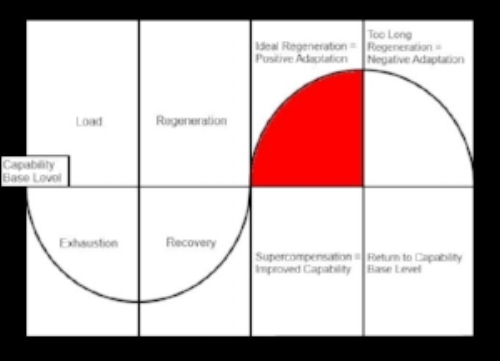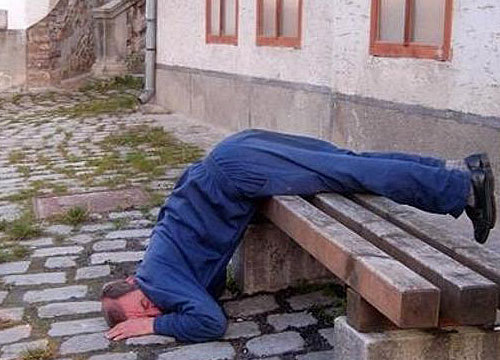The Fitness Equation
Things can look so simple on paper: fuel, work, rest, repeat.
In reality, we mess this up quite a bit.
If life were a math test, at best we’d earn a C. Maybe a C+. Deserving, since we zone out during most lectures, only hearing half of each life lesson. We probably fell asleep on our proverbial desk a handful of times, and we definitely asked to see a friend’s homework more than once. Plus, we never show our work.
And it's extremely likely we ordered ourselves a pizza at one point or another.
Pay Attention
We live in shortcuts and half-truths, cutting corners when possible. It catches up quick, in terms of lifelong health and well-being.
But we also try to make up for our fitness shortcomings, often compensating by overdoing. It’s like cramming for a test the night before.
We're slackers, and we should just pay attention already. Class is always in session.
In months and years past, topics within the fitness equation have received article attention. We recently focused on nutrition and using food as fuel, we previously examined sleep and soreness, and we constantly look into the wide spectrum of exercise movements and related aspects of physical work. But just because we examined one piece of the puzzle doesn't mean we solved all of our problems.
There's a big picture present, and in fitness it involves plenty of real math. VO2Max, caloric intake, metabolic rate, power output, and so on.
To Err is Human
It’s not hard to make mistakes in our training equation, though. In fact, if we’re honest, we all do. Or at least anyone pursuing physical fitness has.
It wasn’t necessarily a huge error, but something has gone wrong at one point or another, right? Simply because we’re human. We’re not perfect. Maybe it was moving incorrectly, with sloppy form. Maybe it was overtraining, putting our body through too much for one day, one week, or one training cycle. We’re not talking about a life-threatening mistake, necessarily; these minor issues just prove our training is in a constant flux. It’s a learning process through each and every week as we work out and advance in this fitness journey.
It’s not hard to make mistakes in nutrition either. I mean, come on… some of these issues aren’t even accidental. Because, donuts… that’s why.
Purposeful cheat meals are actually a usable tool for some people, and a personal belief that, for many of us who won’t spiral out of control, it keeps us sane. Yet nutrition is very often a missing piece of our equation, like a little mathematic misstep that takes us further away from the correct answer as things get complicated.
And what about recovery? Well, if it was possible to mess up something as simple as doing nothing, leave it to us humans. But we get impatient sometimes, neglecting to take rest days. Or else we use too much time off, starting over almost from square one each time. In addition, we might not even know what to do with the recovery time that is taken, or how to use activity in the correct way on rest days to stay loose and maximize physical gains.
Passing This Test Called Life
Follow the fitness equation. It doesn't have to be as complicated as we sometimes make it.
1. Fuel up, primarily for function.
- Eat. Don't be afraid of food. It is our energy source, after all.
- From Food = Fuel: "Our brain runs on carbohydrates. Our muscles do the same, and replenish with protein. Our body systems use fats in so many ways... it's unfortunate they get such a bad rap. [1] These are our calorie providing macronutrients, and with help from vitamins, minerals, and the almighty water, our day to day tasks can be completed."
- Know your body and find out what works both before and after your workouts and competitions.
2. Correctly use the progressive overload principle.
- The body systems respond to work. But they especially adapt when overloaded. Use the overload principle by placing your muscles and cardio system under duress yet within an exhaustion level that doesn't cause degenerative tissue breakdown. This will be noticed with overuse injuries, longer recovery cycles, and/or immune system weakness. A bit tricky, yes, but that's why you don't go run a marathon every day or attempt to deadlift a car just for fun. [1] [2]
- From Scaling: "Keep the body adapting to new stimulus. Your muscles, connecting tissues, energy systems and central nervous system will thank you because you’ve improved. CrossFit doesn't really get any easier, you just become fitter. This allows more workload to occur."
3. Follow up overload with recovery.
- Healthy food can be put on the table. Strength and conditioning work can be done. Mobility issues can be addressed. Weaknesses can be attacked. But sore muscles should receive rest days as well as sleep and replenishment.
- From Sleep: "We may spend an hour in the gym each day, but it's the 23 hours spent recovering where you make actual gains in your fitness. We do work and our cells adapt. The body rebuilds. Muscle cells, connective tissue, and cardiovascular efficiency all improve to resist future stress. During recovery, there are a series of natural hormone responses to the work that has recently been completed; growth occurs with your central nervous and endocrine systems as well."
- Actively recover by using movement to stimulate repair. Our body can do its inherent job after a stressful workout or competition with mobility exercises and self-massage, aiding in recovery. But rest days are used for just that-- rest. So doing as little physical work as possible will help. It's tough, but try not to get roped into another hard workout, even if it sounds awesome. See the bigger picture.
4. Repeat.
- Cycle through these steps in an effort to be consistent, while still using variance. But remember, variety is not the same as being random; follow a program for maximal results.
- Fuel up, work hard, rest when needed, and reap the rewards.
Alright, nerds, don't even ask if this will be on the test. Of course it will. This is the test.
- Scott, 7.27.2014










